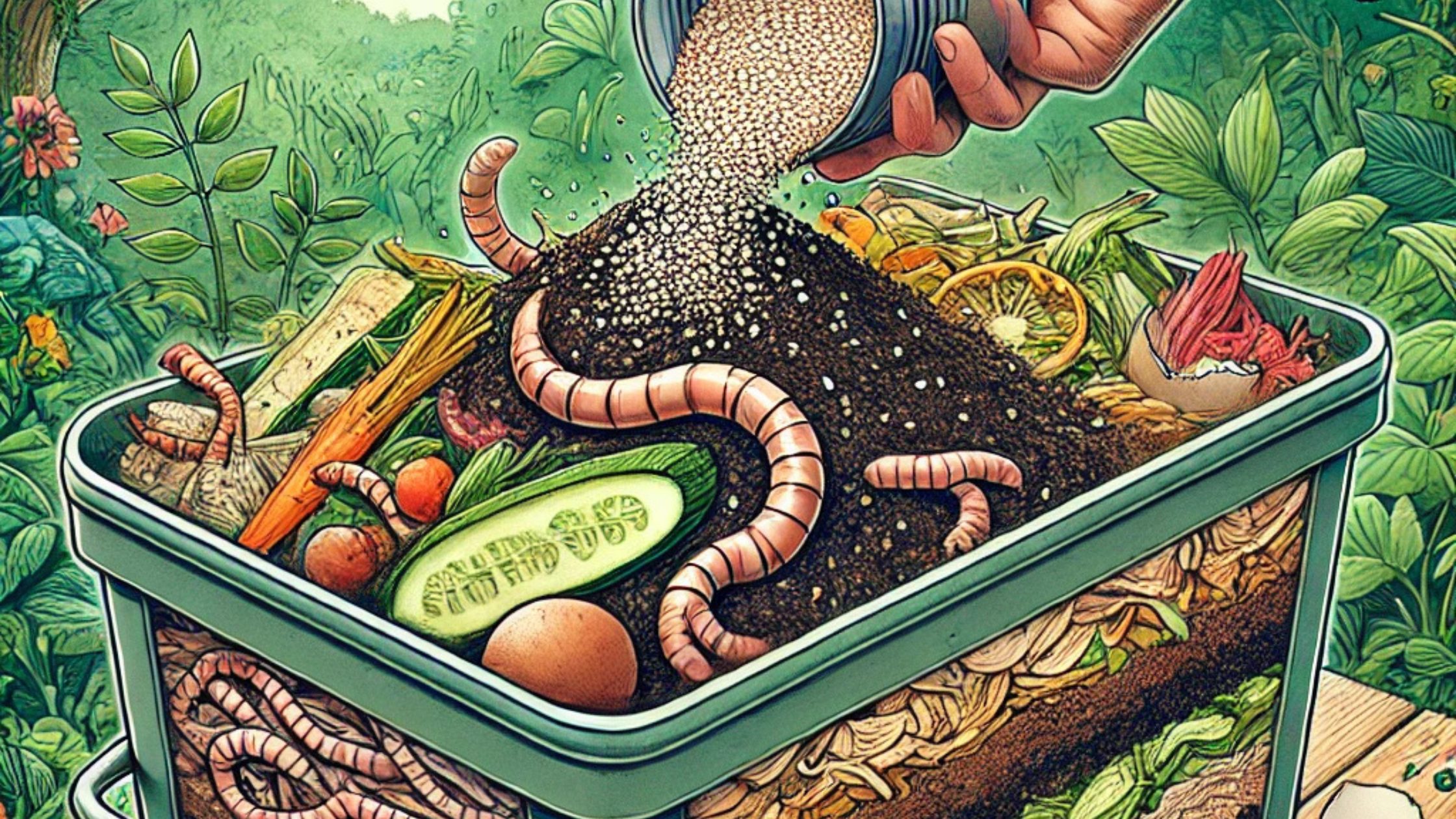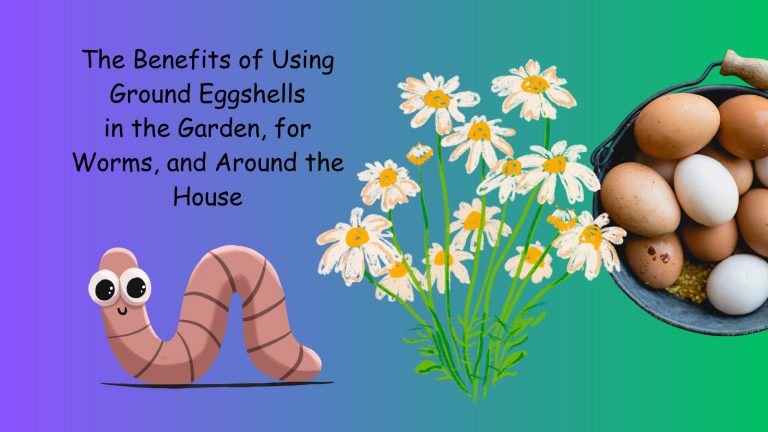
Using Ground Eggshells in Your Worm Bin:
Composting with worms, also known as vermicomposting, is a sustainable and effective way to turn organic waste into nutrient-rich worm castings. While most kitchen scraps are suitable for a worm bin, some materials, like eggshells, play a particularly beneficial role. Ground eggshells are not just waste—they’re a valuable resource that can enhance the health of your worms and improve the overall efficiency of your composting system.
This blog post delves into the benefits of using ground eggshells in your worm bin, how to prepare them properly, and their long-term impact on your vermicomposting process.
Why Use Ground Eggshells in Your Worm Bin?
Eggshells are an excellent addition to any worm bin for several reasons:
- Calcium Source
Eggshells are composed primarily of calcium carbonate (about 95%), which is a critical mineral for the health and reproduction of worms. Calcium is essential for:
- Strengthening worm eggshells (for their reproduction).
- Helping worms process food more effectively by neutralizing acidic conditions in the bin.
- pH Balance
Worm bins can sometimes become too acidic, especially when fed large amounts of citrus fruits, tomato scraps, or coffee grounds. Excessive acidity can harm worms, leading to decreased activity or even death. Ground eggshells act as a natural pH buffer, helping maintain a neutral environment conducive to worm health. - Abrasive Aid
Worms don’t have teeth; instead, they rely on their gizzards to grind food. Small, abrasive particles like finely ground eggshells aid in this process, improving their ability to digest food and turn it into high-quality castings. - Sustainability and Waste Reduction
By reusing eggshells, you reduce the amount of waste sent to landfills while enriching your vermicomposting system. It’s an eco-friendly, zero-waste practice that maximizes the utility of household waste. - Mineral-Enriched Castings
Eggshells contribute trace minerals to the worm castings, enhancing their nutritional profile. These enriched castings make an excellent soil amendment for plants, improving soil fertility and structure.
How to Prepare Eggshells for Your Worm Bin
Simply tossing whole eggshells into your worm bin isn’t ideal; proper preparation ensures maximum benefits. Here’s how to prepare eggshells step by step:
1. Collect and Clean Eggshells
- Rinse eggshells to remove any remaining egg whites or yolks. This prevents odor and reduces the risk of attracting pests.
- Let the shells air dry.
2. Sterilize (Optional)
If you’re concerned about bacteria, you can bake the eggshells:
- Preheat your oven to 200°F (95°C).
- Spread the shells on a baking sheet.
- Bake for 10–15 minutes to sterilize them.
3. Grind the Eggshells
- Use a mortar and pestle, coffee grinder, food processor, or blender to grind the eggshells into a fine powder. The smaller the particles, the more effective they’ll be in neutralizing pH and aiding worm digestion.
How to Add Ground Eggshells to Your Worm Bin
- Sprinkle, Don’t Dump
Sprinkle a small amount of ground eggshells across the top layer of your worm bin. Avoid overloading, as excessive amounts can alter the bin’s pH balance too quickly. - Mix with Other Materials
For best results, mix the ground eggshells with other bedding materials or food scraps. This ensures even distribution and gradual breakdown. - Monitor the Bin
Observe how your worms react. If they seem more active and the bin remains odor-free, you’re using the right amount. - Frequency
Add ground eggshells about once a week or whenever you add new food scraps. Adjust based on the volume of food waste and the bin’s condition.
Benefits of Ground Eggshells for Worms
1. Improved Digestion
Worms rely on abrasive materials like ground eggshells to break down organic matter in their gizzards. Adding eggshells ensures they can efficiently process food, producing higher-quality castings.
2. Enhanced Reproductive Health
Calcium from eggshells strengthens the eggs laid by worms, leading to healthier offspring and a more robust worm population. A thriving population means faster composting and more nutrient-rich output.
3. pH Regulation
By neutralizing acidity, eggshells create a stable environment for worms. A balanced pH helps prevent stress and promotes higher activity levels, ensuring a productive bin.
4. Pest Deterrent
Eggshells can deter certain pests like slugs and ants. While worms thrive in a well-balanced bin, some unwanted invaders don’t tolerate the slightly abrasive or alkaline environment created by eggshells.
Common Concerns and Misconceptions
1. Can Too Many Eggshells Harm Worms?
Yes, overloading your bin with eggshells can raise the pH excessively, creating an environment that’s too alkaline for worms. Moderation is key—sprinkle eggshells sparingly and monitor the bin’s condition.
2. Do Eggshells Attract Pests?
When properly prepared (cleaned and ground), eggshells are unlikely to attract pests. Whole or uncleaned shells, however, might emit odors that draw unwanted visitors like flies.
3. Are Eggshells Necessary for All Worm Bins?
While not mandatory, eggshells offer unique benefits, especially if your worm bin tends to be acidic. If your bin remains neutral and productive without them, eggshells are an optional enhancement.
Eggshells and the Overall Composting Ecosystem
Incorporating eggshells into your worm bin has ripple effects on the entire composting ecosystem:
- Soil Enrichment: Worm castings enriched with calcium and trace minerals from eggshells improve plant growth, making them a valuable resource for gardeners.
- Sustainable Gardening: By recycling eggshells, you contribute to a circular system where waste becomes a resource.
- Better Compost Texture: The addition of ground eggshells improves the texture of worm castings, making them easier to handle and spread in the garden.
Pro Tips for Using Eggshells in Worm Bins
- Combine with Carbon Sources
Pair eggshells with carbon-rich bedding materials like shredded newspaper or cardboard. This helps maintain a balanced carbon-to-nitrogen ratio. - Observe Worm Behavior
If worms seem to avoid areas with eggshells, reduce the amount or grind them finer. - Experiment Gradually
Introduce eggshells in small amounts and observe their impact over time. This ensures you don’t disrupt the bin’s balance. - Use Alongside Other Minerals
For added benefits, combine eggshells with other mineral-rich materials like crushed oyster shells or rock dust.
The Long-Term Benefits of Eggshells in Vermicomposting
Over time, using eggshells in your worm bin can lead to:
- Healthier Worm Population: Strong, healthy worms reproduce faster and live longer.
- Improved Compost Quality: Calcium-rich castings enhance plant growth and soil health.
- Reduced Waste: Recycling eggshells aligns with sustainable living practices.
- Cost Savings: By repurposing eggshells, you save on pH-balancing additives or soil amendments.
Conclusion
Ground eggshells are a simple, cost-effective way to supercharge your worm bin. They provide essential calcium, regulate pH, and enhance worm health and digestion, ultimately leading to richer compost. By properly preparing and adding eggshells to your worm bin, you can create a thriving vermicomposting system that benefits both your garden and the environment.
So, next time you’re making breakfast, don’t toss those eggshells—save them, grind them, and let your worms enjoy the benefits!




